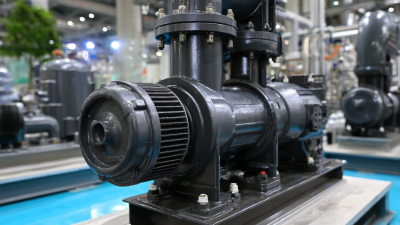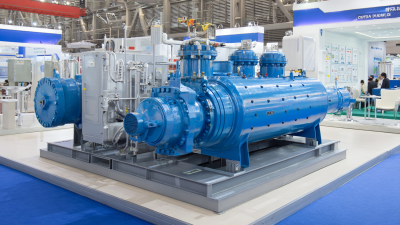
 In the realm of sustainable agriculture, the role of water pump equipment is pivotal in ensuring efficient water management and resource conservation. According to a report by the Food and Agriculture Organization (FAO), nearly 70% of global freshwater withdrawals are dedicated to agricultural practices, highlighting the critical importance of effective irrigation systems. Water pump equipment not only facilitates the distribution of water to crops but also enhances the capability for precision farming, which reduces wastage and promotes sustainability. The International Water Management Institute (IWMI) indicates that adopting advanced water pumping technologies can increase crop yields by up to 30%, underscoring the potential for these tools to improve food security in the face of climate change and growing populations. As countries strive towards sustainable agricultural practices, the strategic implementation of water pump equipment emerges as a foundational element for a resilient agricultural future.
In the realm of sustainable agriculture, the role of water pump equipment is pivotal in ensuring efficient water management and resource conservation. According to a report by the Food and Agriculture Organization (FAO), nearly 70% of global freshwater withdrawals are dedicated to agricultural practices, highlighting the critical importance of effective irrigation systems. Water pump equipment not only facilitates the distribution of water to crops but also enhances the capability for precision farming, which reduces wastage and promotes sustainability. The International Water Management Institute (IWMI) indicates that adopting advanced water pumping technologies can increase crop yields by up to 30%, underscoring the potential for these tools to improve food security in the face of climate change and growing populations. As countries strive towards sustainable agricultural practices, the strategic implementation of water pump equipment emerges as a foundational element for a resilient agricultural future.
Water management is a critical component of sustainable agriculture, directly influencing crop yield and resource conservation. As environmental changes impose stress on water supplies, efficient water pump equipment plays a vital role in optimizing water usage and ensuring that agriculture remains productive and sustainable. By harnessing advanced technologies, farmers can implement precision irrigation systems that deliver the right amount of water at the right time, reducing waste and enhancing the resilience of food systems.
Moreover, the integration of artificial intelligence into sustainable agricultural practices is transforming the landscape of water management. AI-driven innovations, such as smart grids and precision farming techniques, enable more accurate monitoring and control of water resources. These technologies not only help in maximizing water efficiency but also support farmers in adapting to climate variability, thereby fostering a more sustainable future in agriculture. As the global market for green technology expands significantly in the coming years, the focus on effective water management will be pivotal in driving agricultural sustainability and meeting the demands of a growing population.
In the realm of sustainable agriculture, innovative water pump technologies play a crucial role in enhancing irrigation efficiency. Traditional irrigation methods often lead to water wastage and ineffectiveness, whereas modern water pump systems utilize advanced mechanisms to deliver precise amounts of water to crops. These technologies, such as solar-powered pumps and smart irrigation systems, not only optimize water usage but also reduce dependency on non-renewable energy sources, aligning agricultural practices with sustainability goals.
Furthermore, the integration of IoT (Internet of Things) solutions in water pump equipment has transformed irrigation management. Smart sensors can monitor soil moisture levels in real time, triggering pumps to operate only when necessary. This not only conserves water but also ensures that crops receive the optimal hydration they need, promoting healthier growth and higher yields. With the ongoing advancements in water pump technologies, farmers are better equipped to tackle the challenges posed by climate change and resource scarcity, paving the way for a more sustainable agricultural future.
In the quest for sustainable agriculture, integrating digital solutions into water pump systems has emerged as a critical innovation. Studies indicate that approximately 70% of freshwater withdrawals are used for agricultural purposes, according to the Food and Agriculture Organization (FAO). By incorporating smart technology, such as IoT sensors and data analytics, farmers can optimize water usage, reduce waste, and enhance crop yields. For instance, a report from MarketsandMarkets highlights that the precision agriculture market is expected to grow from $7 billion in 2020 to $12 billion by 2025, reflecting a significant shift towards technology-driven farming practices.
Moreover, advanced water pump systems equipped with digital solutions can provide real-time monitoring and control over irrigation processes. This capability not only helps reduce energy consumption but also allows farmers to respond promptly to changing environmental conditions. The International Water Management Institute (IWMI) has found that integrating digital technologies can lead to a 30% increase in irrigation efficiency. As these solutions become more accessible, they pave the way for a more resilient agricultural sector capable of meeting the challenges posed by climate change and water scarcity.
Water pump equipment plays a critical role in sustainable agriculture, particularly in managing water resources effectively and efficiently. With a projected market size of $11.7 billion in 2024 and an expected growth to $28.2 billion by 2033, the electric water pump sector reflects a robust commitment to enhancing agricultural practices. This growth, at a compound annual growth rate of 10.3%, highlights the increasing recognition of the importance of water management in promoting sustainability within the agricultural sector.
Assessing the environmental impact of water pump equipment reveals both positive and negative aspects. On the one hand, advanced water pumping technologies can lead to more efficient irrigation systems, reducing water waste and promoting crop health. However, the production and operation of these pumps may also result in significant energy consumption and greenhouse gas emissions. Therefore, it is essential for stakeholders to carefully evaluate the lifecycle impacts of water pump equipment and invest in innovations that minimize their carbon footprint while maximizing agricultural productivity.
As the demand for sustainable agriculture continues to rise, the evolution of water pump technology plays a crucial role in ensuring that farmers can efficiently manage their water resources. Future trends indicate a shift towards more energy-efficient pumps that harness renewable energy sources, such as solar power. These advancements not only minimize the carbon footprint associated with farming but also ensure that water management practices are sustainable and cost-effective.
Moreover, the integration of smart technology in water pumps is set to revolutionize agricultural practices. Utilizing sensors and IoT (Internet of Things) systems, farmers can monitor soil moisture levels and adjust irrigation schedules in real-time. This precision irrigation not only conserves water but also promotes healthier crop growth by providing the right amount of water at the right time. Automated systems can significantly reduce labor costs and improve overall efficiency, making sustainable farming a more viable option for producers facing resource constraints.
This chart illustrates the increasing impact of water pump technology on agricultural sustainability from 2015 to 2023. The Technological Advancement Index shows a significant upward trend, highlighting the essential role of water pump equipment in enhancing sustainable agricultural practices.






We are here to help you with all your queries and concerns, just write to us using the below form and we will get back to you as soon as we can.